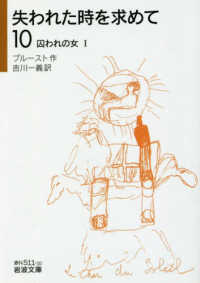- ホーム
- > 洋書
- > 英文書
- > Literary Criticism
Full Description
This study argues that Paul Bowles is more perceptive than many American travelers in Morocco. The book provides us with what are perhaps the most sustained meditations to date on Bowles's translation work and his autobiography, as well as perceptive analyses of key stories such as "A Distant Episode" and "Here to Learn" and his second novel, Let It Come Down, set primarily in Tangier. The chapter on translation dwells on the complex interactions between Moroccan storytellers and Bowles. The work considers translation as a site where the oral and written, colonial and post-colonial scene, and English and Maghrebi come face to face; it is a place where things are worked out in dynamic interaction. The chapter on Bowles's autobiography Without Stopping, urges us to take this piece of self-writing (famously dubbed Without Telling by William Burroughs) more seriously, drawing our attention to baroque architectural features of mind and external landscape, worlds distorted by mirrors, dreams, and fluid transit where forms morph. The work also highlights difference between experience and representation of experience through language, transformed through the prism of memory. In the chapter on Without Stopping as well as in my discussions of Bowles's fiction, I provide useful elaborations of connections between Bowles's work and that of Edgar Allan Poe. My reading of one of Bowles's best-known stories, "A Distant Episode," brings to the surface a recognition that the tragic fate of the Professor, the story's protagonist, is an outcome of his inability to admit that cultures are not static. The academically trained linguist demonstrates an unwillingness or inability to adapt to change, or to read cultural signs accurately. The message is that Morocco is not stuck in time, and cannot be held in place by Orientalist fantasies or preconceived, externally derived intellectual constructs and assumptions. The book concludes that against the grain of Samuel Huntington's notion of Clash of Civilizations, Bowles's poetic and geographical journey forcefully projects cosmopolitanism and transnational attention confirming that civilizations and 'identities' open up rather than shut down, war or clash.
Contents
Foreword by Allen Hibbard
Introduction - Realizing the Textual Space: Meta-fictional Speculations in Paul Bowles's Work
Chapter 1 - Moroccan Oral Stories: Translation and Mediation
Chapter 2 - Without Stopping: The Memory of that Memory
Chapter 3 - Selected Fiction: The Myth of the Fall into Modernity
Conclusion - Morocco: Paul Bowles' Peripheral Centre







